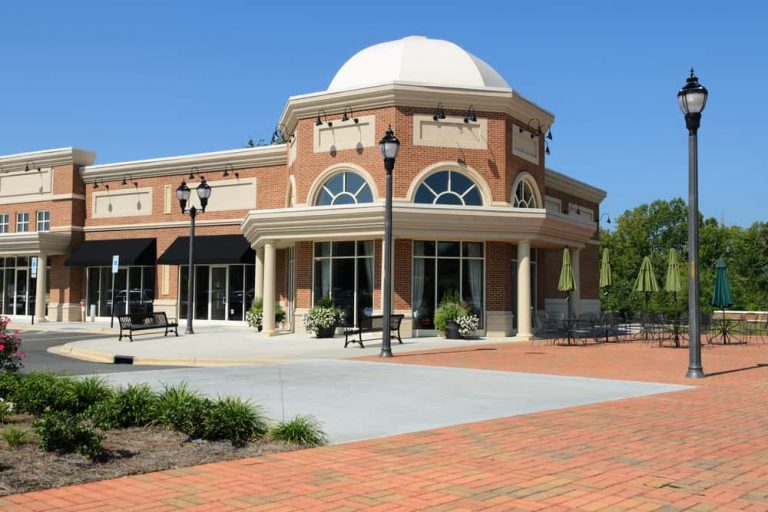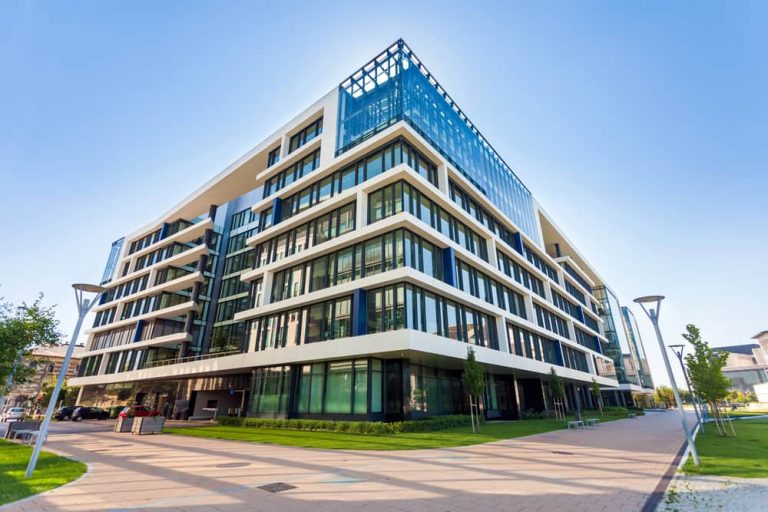If you feel ready to enter the niche market of commercial real estate investing, now is the perfect time to develop an understanding of commercial real estate financing basics to determine if this unique industry is a good fit for you. Use the information below as your commercial real estate financing basics guide, and before you know it, you’ll have a better understanding of how commercial property loans differ from residential loans, the different types of loans and lenders that are available, and a broad overview of how commercial real estate financing works.
What Are Commercial Property Loans?
Commercial property loans are mortgages specifically delegated to purchasers of commercial properties.
Properties are considered commercial if they produce income and are used for business purposes only. A common example of a commercial property is a retail or an office space through which a business is operated. To acquire such a property, an investor can select from several commercial real estate financing options, but should be prepared to guarantee the mortgage via a lien, or more simply, collateral. If the investor fails to meet the commercial property loan’s repayment terms, the creditor reserves the right to seize the property. Experts at HostPapa suggest that “developers, trusts, funds, and corporations are the most common recipients of commercial real estate loans. The loan terms span from 5 to 20 years, with an amortization period that is longer than the loan duration”.
It is also important to note that commercial property loans are made out to business entities and not individuals. In other words, financing commercial real estate usually requires the formation of a business entity, such as an s-corporation or a limited liability company.
Anthony Martin, the founder of Choice Mutual, says that “the main difference between residential and commercial loans is what they’re for. For example, commercial loans are for business properties, multiple investment properties (surpassing 5 -10–depending on the lenders you had before), and other specialty properties. In contrast, residential properties are meant for personal properties”.
[ Thinking about investing in real estate? Register to attend a FREE online real estate class and learn how to get started investing in real estate. ]

Commercial vs. Residential Loans
While residential loans are typically assigned to individual borrowers, commercial loans are typically granted to business entities. Residential loans require high loan-to-value ratios of up to 100%, while commercial loan-to-value rations range within 65% – 80%. In addition, commercial loans range from 5 to 20 years, while the most popular residential loan is a 30 year fixed mortgage.
Commercial Real Estate Financing Options
Understanding commercial real estate financing basics requires a working knowledge of existing commercial property financing options, and being able to identify which option might work best for you. Commercial property loans will not only help finance the property, but can also help fund any construction projects as needed. Also, investors can leverage commercial property financing to help keep properties fully operational and maintained so that they may be fully leased.
The following are several commercial real estate financing options that are offered by various financial entities, including banks, private lenders, insurance companies, pension funds, and the U.S. Small Business Administration:
-
SBA 7A Loan: The U.S. Small Business Administration (SBA) offers some of the least expensive loans for investing in commercial real estate and guarantees repayment of a portion of the loan. SBA-backed loans help the borrower by increasing credibility and reducing risk for the lender. 7A loans work best for smaller projects and are the quickest and easiest of the SBA loan programs. Although 7A loans have slightly higher interest rates than SBA 504 loans, they are the SBA’s most popular loan option.
-
SBA 504 Loan: As mentioned above, loans backed by the Small Business Administration are favored by lenders. The 504 loan program works best for larger investment projects, such as those valued over $1 million. The investor must put down 10 percent of the loan amount as the down payment, while 40 percent of the loan is sourced from an SBA Certified Development Company. The remaining 50 percent is borrowed from the lender.
-
Conventional Bank Loan: A majority of commercial real estate loans are made by banks, who prefer to lend to entities with strong credit histories. Individuals with a credit score of at least 660 and are working with mid-to-large-sized projects will find conventional bank loans as a viable commercial real estate financing option. Bank loans offer competitive interest rates and do not require the property to be occupied by the owner. However, most bank loans require a 20 percent down payment and oftentimes will charge a penalty if the loan is paid off early.
-
Hard Money Loan: For investors looking for a quick solution to commercial real estate financing may look to a hard money loan. Hard money lenders usually offer short-term loans at high-interest rates, and evaluate the loan based on the perceived value of the property and not on the borrower’s credit history. Investors will often utilize hard money loans to quickly finance deals in the interim while negotiating a longer-term bank loan. Because of this, hard money loans are also referred to as “bridge loans.”
-
Online Marketplace Loan: Sometimes referred to as “soft money loans,” online marketplaces now help to match borrowers with private investors who help finance commercial properties for a return. This type of loan is referred to as a soft money loan because interest rates are still higher than conventional bank loans but are lower than loans from hard money lenders. Online marketplaces usually match borrowers with shorter-term loans ranging from six months to a few years.
-
Joint Venture Loan: In cases in which an investor cannot obtain commercial real estate financing, or in cases where it is unappealing to bear risk solely, pursuing a joint venture may be the best option. Two or more properties can apply for financing via a joint venture loan, and involved parties will equally share the risks and returns in the commercial property. The joint venture loan ties the parties together solely around the specific property and does not require the entities to enter into a true real estate partnership.

How Do Commercial Real Estate Loans Work?
Commercial real estate loans work differently from residential loans in that they are solely utilized to finance income-producing properties through which businesses are operated. While individual borrowers can apply for traditional residential loans, investors normally have to establish a business entity, such as an LLC, to qualify for a commercial real estate loan. To secure the loan request, lenders will also require commercial property borrowers to put up the property as a lien or collateral. If the borrower were to ever default on their mortgage payments, the lender could seize the commercial property.
Creditworthiness is a common factor between commercial property loans and residential loans. Still, lenders will also closely examine the property’s potential income production when deciding whether to approve a loan request when it comes to commercial real estate.
Although commercial real estate loans may be associated with a higher risk than residential mortgages, lenders are incentivized by the potential revenue to be made off of commercial properties. For example, properties that can serve as a hotel, event venue, or house multiple businesses promise to attract wealthy tenants. In return, lenders can expect to earn a portion of the revenue made by commercial property tenants.
How Can I Get A Loan For A Commercial Property With No Money Down?
You can get a loan for a commercial property with no money down by utilizing a variety of financing methods, such as a purchase money mortgage, an investing partner, or a hard money lender. Investors who have focused their careers on residential real estate may have shied away from commercial properties simply due to the perception that the associated risks and costs are great or that the down payment is prohibitive. However, by familiarizing themselves with commercial real estate financing basics, investors should find that commercial properties are not inaccessible.
Suppose an investor cannot afford the down payment required by certain commercial real estate financing options. In that case, they can find an investing partner who is willing to provide the funds required to qualify for a loan, such as a traditional bank loan. However, it should be noted that the property should promise attractive returns for the investment to be considered worthwhile for a partner.
Another viable option is going through a hard money lender. Bridge loans can help investors secure short-term funding for a down payment so that they may negotiate a longer-term loan through a more traditional lender. However, borrowers should beware that hard money lenders usually provide loans with high-interest rates.
Finally, investors can also explore purchase money mortgages as a possible way to finance a commercial deal with no money down. Also known as seller-financed deals, purchase money mortgages come into play when a seller is willing to offer a loan directly to the borrower to purchase the property. This option can benefit both parties, as flexible repayment terms and rates can be negotiated. However, the borrower will risk repossession by the seller if they fail to make mortgage payments.
What Is The Interest Rate On Commercial Real Estate?
The interest rate on commercial real estate varies significantly based on the type of loan that the borrower chooses to elect. Loans backed by the Small Business Association tend to have the lowest interest rates. For example, the SBA 7A interest rate varies between 5.5 and 6.75 percent, while the 504 loan ranges between 3..5 to 6 percent. Conventional bank loans offer fixed or variable interest rates, typically between the 5 to 7 percent range. Hard money loans from private investors come in with the highest interest rates on the market, typically between 10 to 18 percent. Hard money loans can be fixed or variable and have the shortest loan terms.
Recouse Vs. Non-Recourse Loans
As mentioned above, commercial loans will need to be secured with collateral. There are two main routes to take: recourse or non-recourse loans. A recourse loan, more commonly called a personal guarantee, is when an investor uses other assets as collateral for the debt. For example, the loan could be secured with a personal liability that if the property goes out of business you will make monthly repayments.
Alternatively, many commercial loans are secured by the properties themselves through a non-recourse loan. If the borrower defaults on a non-recourse loan, the lender can seize the asset itself. According to the terms of this loan, the lender can not secure additional money or assets from the borrower.
It may sound preferable to choose a non-recourse loan, but depending on how long you have been in business the lender may require another form of collateral. If you are a new real estate investor or have a less than stellar financial background, the lender may need additional security before financing the property. Speak with your preferred lender to evaluate your options in regards to recourse vs. non-recourse loans.
Loan Repayment Terms
Commercial real estate financing repayment periods commonly range from 5 to 20 years. The amortization period is usually longer than the term of the loan. For example, if you have a commercial loan for a term of 10 years with an amortization period of 30 years, you would make payments for 10 years of an amount based on the loan being paid off over 30 years, followed by a final payment of the entire remaining balance on the loan.
How long the commercial real estate loan term is and the amortization period affects the rate the lender will charge you. Depending on your credit, commercial real estate financing terms can be negotiable. Keep in mind that the longer the loan, the higher the interest rate will be.
Important Loan Ratios
In determining commercial real estate financing, lenders consider the loan-to-value ratio (LTV) and the debt-service coverage ratio (DSCR). It is important to know these ratios as they will determine your financing rates and loan size. Here is a brief overview of the two ratios:
-
Loan-To-Value-Ratio: The loan-to-value ratio (LTV) measures the value of a loan against the value of the property. LTV is calculated by dividing the amount of the loan by its purchase price. For example, the LTV for a $80,000 loan on a $100,000 property would be 80% since $80,000 ÷ $100,000 = 0.8.
Those with lower LTVs will qualify for better financing rates for commercial real estate loans than borrowers who have higher LTVs. With more equity in the property, it is less risky, according to the lender.
-
Debt-To-Service-Ratio: The debt-service coverage ratio (DSCR) compares a property’s annual net operating income (NOI) to its annual mortgage debt service. The ratio measures the property’s ability to service its own debt. You calculate the DSCR by dividing the NOI by the annual debt service.
For example, a property that has $100,000 in NOI and $80,000 in annual mortgage debt service would have a DSCR of 1.25 since $100,000 ÷ $80,000 = 1.25. The DSCR will influence your lender’s maximum loan size, which will be based on the property’s cash flow.
A DSCR should be more than 1; otherwise, the property has negative cash flow. For example, a DSCR of .9 means that there is not enough (only 90%) in NOI to cover annual debt service. Commonly, commercial real estate lenders seek a higher DSCR to ensure cash flow.
Commercial Real Estate Financing Calculator
To calculate a commercial real estate financing scenario, an investor will need to obtain the possible loan amount, interest rate, amortization term, and any balloon payments if applicable. The loan amount represents the total principal on the commercial loan, while the interest rate varies greatly depending on the lender type. Commercial loan terms typically range between five to 20 years, whereas the amortization period can be longer than the loan term. The balloon payments come into play when the borrower makes payments throughout the duration of the loan term but is then required to make a final payment on any outstanding amount on the principal. Although this may sound extremely complicated, luckily, there are many online financing calculators available, such as on Mortgage Calculator.

5 Best Banks For Commercial Real Estate Loans
If you decide to pursue a commercial real estate loan through a conventional bank, you will likely become overwhelmed at the number of options. Just like residential real estate loans, there are a mix of online and brick-and-mortar banks to choose from — each offering unique pros and cons to help you decide. Deciding on a loan provider will come down to your own personal finances and business goals. That being said, here are five of the best banks for a commercial loan to help you get started:
-
U.S. Bank: U.S. Bank offers several types of commercial loans, including small business loans. Interest rates vary between five and seven percent, with variable and fixed options. Many investors choose U.S. Bank for long-term commercial financing needs and for occupied properties. U.S. Bank has physical branches in 26 states but offers mortgages nationwide.
-
Wells Fargo: Wells Fargo is a great option for investors looking to avoid a “years in business” requirement when applying for a commercial loan. With loan terms up to 20 years for larger projects, Wells Fargo offers a number of different options. Average interest rates are between five and 10 percent and the target loan-to-value ratio is roughly 80 percent.
-
JPMorgan Chase: JPMorgan Chase advertises itself as the leading multifamily loan provider, with a maximum loan of up to $25 million on multifamily projects. A property must have at least five units to be considered multifamily. There is no time in business requirement, and interest rates range from five to nine percent.
-
Bank Of America: Bank of America offers commercial financing, and additional options for remodeling down the road. Their website boasts interest rates as low as three percent; and loan terms can range from 10 to 15 years. Bank of America also offers loan origination discounts for Veterans.
-
SmartBiz: If you are in the market for an SBA7(a) commercial loan, consider SmartBiz for your next project. Interest rates range between 4.7 and 7 percent, and down payment requirements are between 10 an 30 percent of the purchase price. Note that SmartBiz is an entirely online loan provider.
Summary
With these commercial real estate financing basics in mind, investors should feel better equipped to approach their first commercial deal. Commercial real estate is a unique niche that differs greatly from traditional residential real estate and should not be taken lightly. However, those who feel prepared to tackle this sector of the real estate industry have the potential to enjoy a unique experience and an equally unique set of rewards.
Ready to start taking advantage of the current opportunities in the real estate market?
Click the banner below to take a 90-minute online training class and get started learning how to invest in today’s real estate market!

